
Lot 130

Nelson, Horatio, Viscount Nelson (1758-1805)
Document signed by Lord Nelson, Lady Emma Hamilton, Captain Thomas Hardy, and others

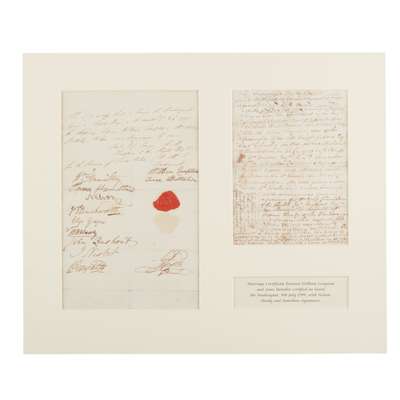
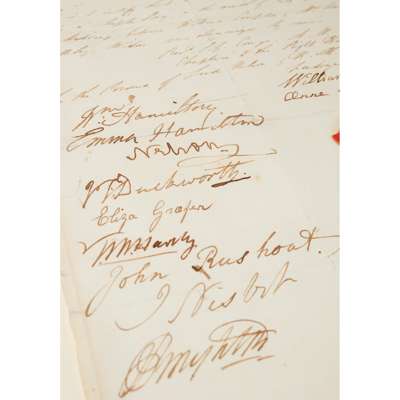
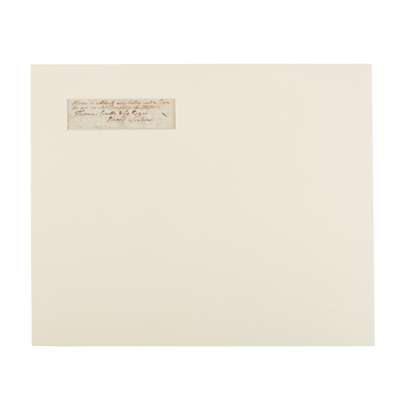
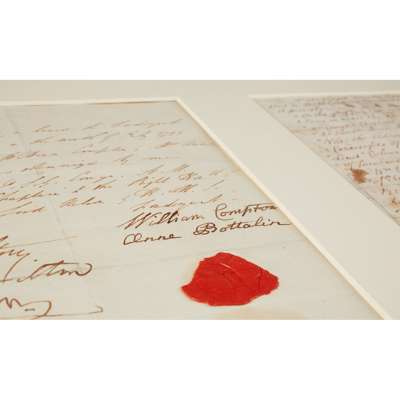

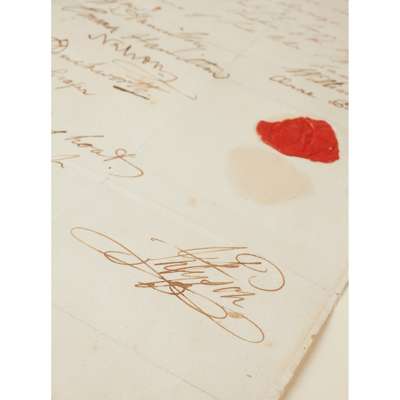
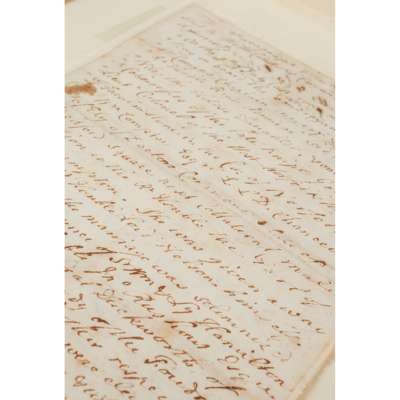


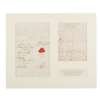
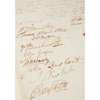

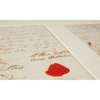

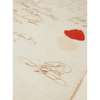
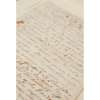

Rare Books, Manuscripts, Maps & Photographs
Auction: 8 February 2023 at 10:00 GMT
Description
certifying the marriage of William Compton and Anne Bottalin, HMS Foudroyant, Bay of Naples, 9 July 1799.
Brown ink on single sheet of laid paper with Britannia watermark, remains of red wax seal, mounted (mount aperture 30.8 x 19.2cm). Old folds; paper worn away at intersections of a few folds; professional consolidation along folds and edges; a few spots and minute holes; line of offsetting around periphery from mount; old staining from wax seal.
Main text reads 'This is to certify that, on board the Foudroyant lying in Naples Bay, on the ninth of July 1799 the marriage between William Compton & Mrs Anne Bottalin, widow, was solemnized by me S. G. Comyn HM. Chaplain to the Right Honble Lord Nelson, H.M.S. Foudroyant, in the presence of'. With the following autograph signatures:
Sir William Hamilton (1731-1803);
Lady Emma Hamilton (1765-1815);
Horatio Nelson, Viscount Nelson (1758-1805);
Sir John Thomas Duckworth (1747-1817);
Sir Thomas Masterman Hardy (1769-1839);
John Rushout, 2nd Baron Northwick (1769-1859);
Josiah Nisbet (1780-1830);
John Tyson;
William Compton and Anne Bottalin;
and 2 others.
Mounted together with the document is a contemporary manuscript account of the wedding, headed 'Paragraph for the papers, sent to Messrs Coutts & Co with request to have it inserted'
Footnote
Note:
A spectacular document never before offered for sale, uniting Nelson with an astonishing array of characters in his story and providing a snapshot of a moment of sublime unreality amid a period of high tension in the contest for the Mediterranean, when dismayed observers perceived the judgment of the victor of the Nile to have been fatally disturbed by his pursuit of a scandalous love affair.
Nelson's signature is juxtaposed with those of both Hamiltons and three of his fellow naval officers who had most to regret in his behaviour: Thomas Masterman Hardy, his flag-captain at Trafalgar and famed recipient of his near final words; Josiah Nisbet, his stepson and rescuer at Tenerife, where Nelson lost his right arm; and John Duckworth, who, recently promoted rear admiral, sailed to Naples to reinforce Nelson, and as his second in command was required to cover Minorca on his behalf. John Rushout, collector and connoisseur, was in Naples as attaché to Sir William Hamilton; John Tyson was Nelson's personal secretary on the Foudroyant.
Hardy was the most junior of Nelson's 'band of brothers' who secured the decisive victory over Napoleon in the Battle of Nile in August 1798. He was then promoted to Nelson's flagship, the Vanguard, before moving with him to the Foudroyant. At Trafalgar he was with Nelson during his final hours. Nelson's last words to his flag-captain have gone down in naval folklore as 'Kiss me, Hardy'; less frequently remembered is his request immediately beforehand: 'Take care of my dear Lady Hamilton, Hardy, take care of poor Lady Hamilton'. Hardy was appointed First Sea Lord in 1830 and oversaw the building of Nelson's Column.
Nelson was fond of his stepson Josiah Nisbet, daughter of his Nevis-born wife Fanny from her first marriage, and took him to sea to train as a naval officer. They were side by side in the failed assault on Tenerife in 1797, when Nisbet applied a tourniquet to Nelson's wounded right arm, and got him back to the Theseus, where the arm was amputated. Between 1798 and 1800 he commanded the Thalia on the Mediterranean station, but according to the Royal Naval Biography fell out with his stepfather 'by remonstrating with him on his infatuated attachment to Lady Hamilton', and held no subsequent appointment.
Nelson had been impressed by Lady Hamilton's bravery during the evacuation of the Neapolitan royal family to Palermo in December 1798, and by February the pair were lovers, with Sir William Hamilton, ambassador to Naples, a complaisant adjunct to the relationship. 'Vivacious and uninhibited even by the relaxed standards of the Bourbon court, [Hamilton] threw herself, and drew him, into an extravagant social round of spectacles, drinking, and gambling. Emma Hamilton's earlier career as a courtesan had taught her skills which might have overcome a more sophisticated and less vulnerable man than Nelson ... Her friendship with the queen [of Naples] and her intimacy with the hero of the hour placed her at the centre of affairs, and she relished the position' (ODNB).
In June Nelson sailed for Naples to continue his expedition against the newly established French satellite republic. On 13 July he received the first of three orders from Lord Keith, commander-in-chief in the Mediterranean, to sail to Minorca in anticipation of a Franco-Spanish assault, all of which he refused, and though he reasoned that Naples was of greater strategic importance, his conduct left the British fleet dangerously exposed.
Dr William Compton, the chancellor of Ely and a relative of the earl of Northampton, and Anne Bottalin, daughter of a sometime mayor of Norwich, were both British residents of Naples who have otherwise left little mark in posterity. Their marriage onboard the Foudroyant, with Nelson himself giving away the bride, was a lavish affair, the accompanying despatch describing how '[they] were elegantly entertained at dinner & with music by Ld Nelson who did them the honor to accompany them in his own barge (which he had also sent for them) with Sir Wm & Ly Hamilton ... in the evening to Mr Compton's house at Posilipo'.
Nelson's solicitude at such a juncture is picked out by his principal modern biographer John Sugden as evidence for a lesser-known side of his character: 'A man who invested time, effort and money into friendship, [Nelson] was hurt by anything resembling ingratitude. Even in these troubled times, we find him generous with now forgotten benefices. William Compton ... received "a great many favours and kindnesses" from Nelson, and most especially "the kind interest" taken in sealing his union with a wife who made him "the happiest of mortals". Anne, the aforesaid spouse, said that the admiral's "good heart" had made her "as happy as I can possibly be on this earth" ... Midshipman Parsons remembered those days nostalgically, noting the great improvement [King Ferdinand of Naples] made to the ship's mess, Emma's "graceful form" bending over her harp to bestow "heavenly music" upon the diners on the quarterdeck and the large-decked galley, flush with opera singers, that glided alongside to serenade the sunset of each day' (Nelson: The Sword of Albion, p. 255).
Provenance:
By direct descent from William Compton and Anne Bottalin to the vendor.

















